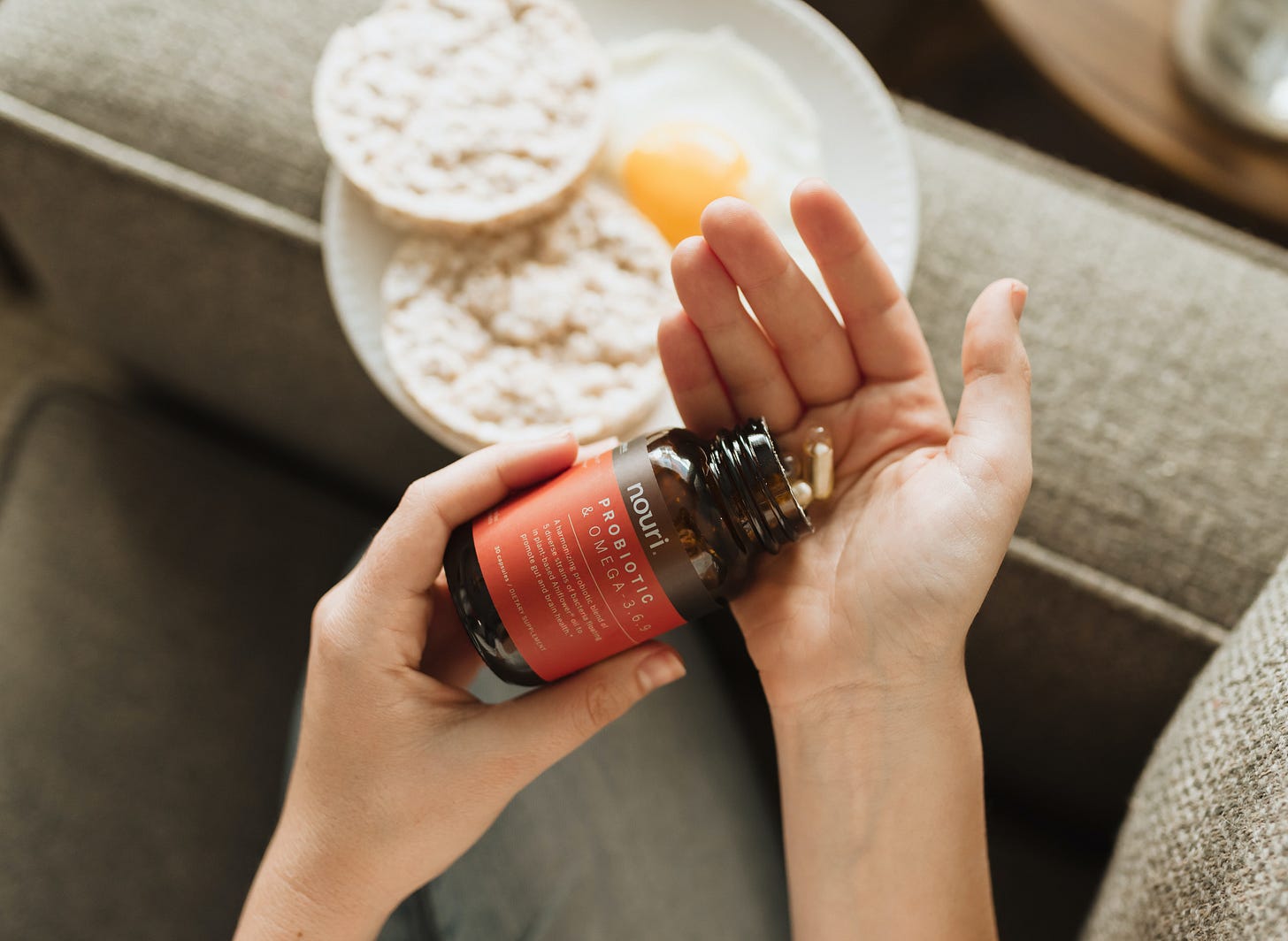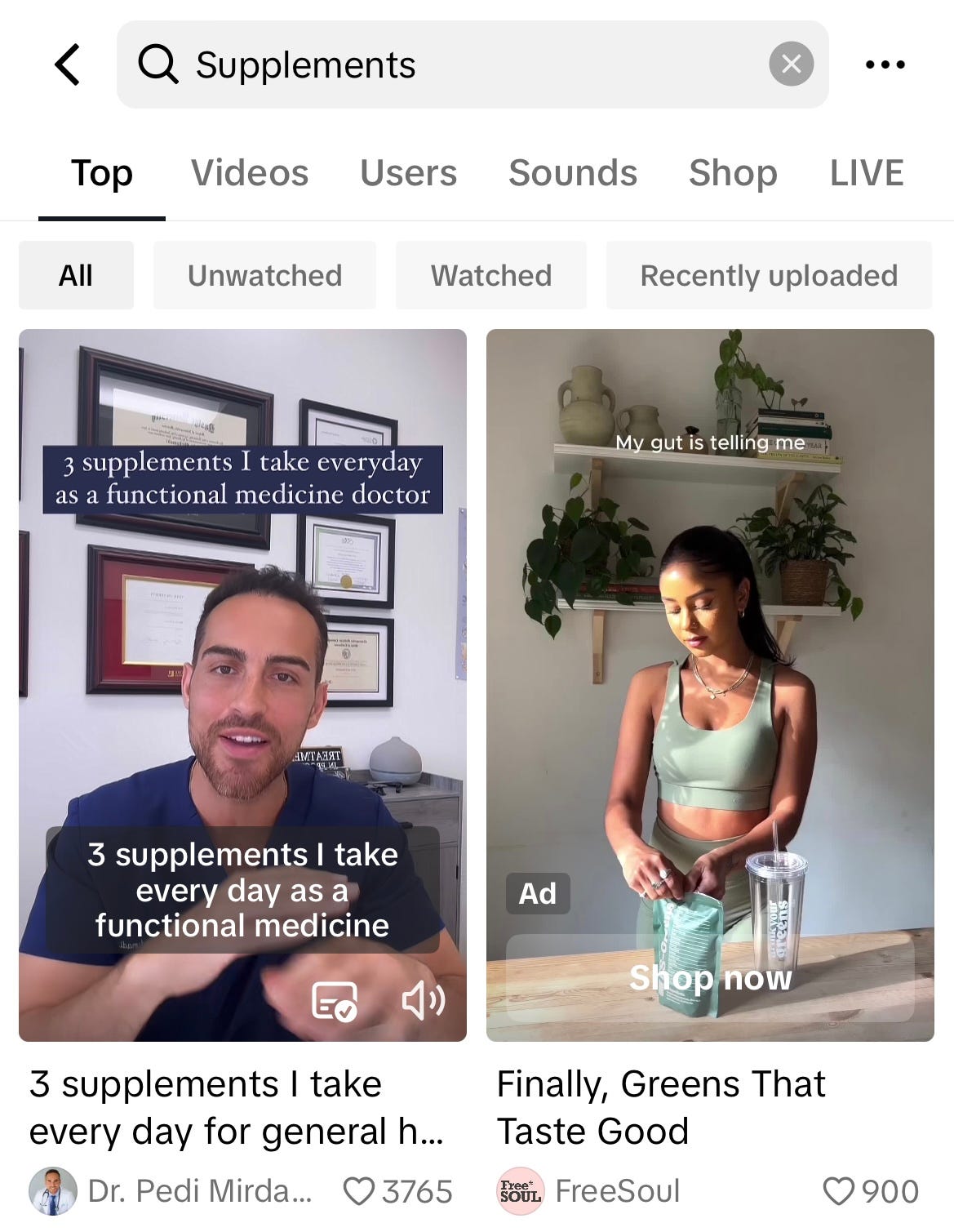Supplement Supremacy - The Rise of Supplements in the UK
Are herbal remedies making a comeback?
Supplements are not a new phenomenon. Alongside herbal medicinal treatments, supplements have been used for decades across the globe to treat various ailments or deficiencies that diet alone cannot. However, with the understandable rise of wellness culture, post-pandemic, have we all become our own healers?
What are supplements?
According to the Food Standards Agency, supplements are 'any food the purpose of which is to supplement the normal diet and which is a concentrated source of a vitamin or mineral or other substance with a nutritional or physiological effect, alone or in combination and is sold in dose form'. These supplements are marketed and sold in various shops, ranging from your local supermarket to Amazon, and are a million-pound industry in the UK alone. Under the UK Food Supplements Regulation 2003, all food supplements in the UK are regulated, however, there is no national legislation for the maximum amount of levels of vitamins that are used in supplements.
Data published by YouGov UK from a poll of circa 220 respondents shows that in January 2020, pre-pandemic, the percentage of 18-24-year-olds that said Yes to taking a supplement at least once a week was 29%, and those that said No was 66%. However, in 2023 following the pandemic, these results changed dramatically with the respondents who said Yes increasing to 43% and those who said No dropping to 46%.
This same trend can also be seen between the ages of 25-49, as displayed in the graph below:
So, what is causing this attitude shift?
Many reasons can explain why there has been a significant shift in attitudes with people deciding to supplement their diet. Unsurprisingly, the COVID-19 pandemic is a large factor at play here. The pandemic affected everyone and made us all glaringly aware of our mortality. Watching the death toll rise daily on the news, had physical and psychological impacts that lingered with us all. As a result, the rise in supplementation and natural, herbal medicine became increasingly popular. This was particularly true on the Social media site, TikTok, which gained large amounts of new members during the Pandemic due to the lockdowns that required people to stay indoors. Currently, the hashtag #Supplements has 5.4 Billion views on TikTok.
Another big factor that may have affected the rise in the use of supplements are the NHS waiting lists. With thousands waiting for treatment, people have had to become their own doctors to an extent and explore natural ways to ease their symptoms whilst they await medical treatment. This is where supplements come in.
‘I knew that my appointment was 4 months away but I was constantly exhausted and I wanted to try and see if taking a supplement eased my symptoms.’
Amy, a 22-year-old University student tells me that she has struggled with fatigue and tiredness for years. Despite constant doctor appointments and consistent blood tests showing that she is anemic, her appointment is currently 4 months away. Amy tells me that she began researching and since then, has been taking an iron supplement that has eased her symptoms slightly, ‘I knew that my appointment for 4 months away but I was constantly exhausted and I wanted to try and see if taking a supplement eased my symptoms.’
While it is clear to see the numerous benefits supplements provide, what are the risks?
As mentioned earlier, supplements are regulated, yet the lack of national legislation for the strength of supplements raises concerns. Despite voluntary guidelines provided by the government on safe levels of vitamins (based on the 2003 report by the Expert Group on Vitamins and Minerals), there is still room for some brands to use strengths that are higher than these voluntary guidelines which could cause harm to those who are taking them. As well as this, if people are taking supplements without the support of a medical professional, it can be hard to gauge what strength to take or which specific supplements are required for their individual needs. These variables can impact the vitamin’s desired effect and can be potentially dangerous if someone is taking too high a dose. According to the NHS website, taking too many supplements at too high doses long term can cause damage to your health. The NHS website also states that most people do not require supplements as long as they are eating a healthy, balanced diet.
When do we need to take a supplement?
According to the NHS, supplements are required in the following situations:
Pregnancy - The NHS recommends that those who are trying for a baby or who are currently pregnant should take 400 micrograms of folic acid every day until they are 12 weeks pregnant.
Vitamin D - Due to the lack of sunshine and the inability to gain enough vitamin D through food alone, it is recommended that everyone takes a 10-microgram vitamin D supplement during the autumn and winter.
Vitamins A, C, and D - Children between the ages of 6 months and 5 years should take these supplements daily
‘There’s no clear evidence to suggest benefits of dietary supplement use for many popular or common health outcomes’.
Dr. Fang Fang Zhang, professor in the School of Nutrition Science and Policy at Tuft’s University told TIME magazine last year ‘There’s no clear evidence to suggest benefits of dietary supplement use for many popular or common health outcomes’.
Ultimately, the choice to take supplements and which ones to take is a very individual decision. Either way, whether you are pro or anti-supplements, this change in attitude is a positive one. This change and the data previously mentioned show that we are all more health-conscious and taking our health and well-being into our own hands. That is something that I can support.
If you are considering taking supplements, it is advisable to speak to your healthcare provider beforehand.
For more information on supplements in the UK please visit: https://www.nhs.uk/common-health-questions/food-and-diet/do-i-need-vitamin-supplements/





